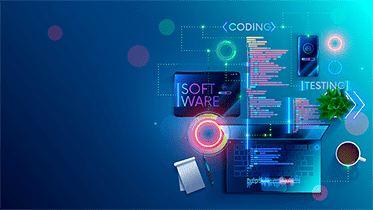Why Application Development is Crucial
Application development is at the heart of modern businesses, acting as the backbone for improved customer experiences and streamlined internal processes. With advancements in Generative AI app development, companies are finding more innovative ways to address customer needs, enhance workforce automation, and achieve operational efficiency.
The Role of Application Development in Today’s World
Business Growth: Applications help businesses expand their digital presence, offering customers services conveniently.
Efficiency: Workforce automation through apps simplifies repetitive tasks, enabling teams to focus on core responsibilities.
Customer Engagement: Apps provide personalized experiences, strengthening customer loyalty and trust.
Native vs. Hybrid App Development: Which is Better?
One of the primary decisions for an application development company is choosing between native and hybrid app development. Both have unique advantages and challenges, making them suitable for different needs.
Native App Development
Native apps are built for specific platforms, such as iOS or Android, using platform-specific programming languages.
Advantages:
Performance: Native apps provide superior speed and responsiveness due to platform optimization.
User Experience: They offer seamless integration with device features like cameras and sensors.
Scalability: Native apps are easier to scale for advanced functionalities.
Disadvantages:
Cost: Developing separate apps for multiple platforms can be expensive.
Development Time: Native apps typically take longer to develop.
Hybrid App Development
Hybrid apps are developed using a single codebase, running on multiple platforms.
Advantages:
Cost-Effectiveness: A single codebase reduces development costs.
Faster Deployment: Hybrid apps take less time to develop and launch.
Maintenance: Updates and bug fixes can be applied across platforms simultaneously.
Disadvantages:
Performance Limitations: Hybrid apps may not perform as well as native apps.
Customization Challenges: Limited access to platform-specific features can restrict customization.
Choosing the Right Approach
For businesses focused on high performance and user experience, native app development is ideal. On the other hand, companies aiming for cost efficiency and quick deployment might prefer hybrid development.
The Impact of Generative AI on Application Development
The emergence of Generative AI app development is revolutionizing the industry. Generative AI uses advanced algorithms to create content, simulate scenarios, and automate decision-making processes.
Generative AI in Workforce Automation
Generative AI has significant implications for workforce automation:
Task Automation: From data entry to customer support, AI-powered apps streamline repetitive tasks.
Personalized Services: AI enhances user experience by predicting preferences and tailoring recommendations.
Decision Support: Apps equipped with AI assist managers in making data-driven decisions.
Benefits of Integrating Generative AI in Apps
Improved Productivity: Automating mundane tasks frees up employee time for strategic activities.
Cost Savings: AI reduces labor costs while maintaining high-quality output.
Innovation: Generative AI fosters creativity, enabling businesses to explore new possibilities.
Application Development for Workforce Automation
Workforce automation is transforming industries by enhancing efficiency and reducing operational costs. An application development company plays a vital role in creating tools that automate workflows and streamline processes.
Features of Workforce Automation Apps
Integration: Seamless connectivity with existing systems ensures smooth operations.
Analytics: Real-time insights enable better resource management.
Scalability: Apps designed for workforce automation should accommodate business growth.
Examples of Workforce Automation
Manufacturing: Automation apps monitor machinery and optimize production schedules.
Healthcare: AI-driven apps improve patient scheduling and medical record management.
Retail: Apps streamline inventory management and enhance customer service.
Future Trends in Application Development
AI-Powered App Personalization
Generative AI will continue to drive personalized user experiences. Apps will adapt to individual user behavior, providing recommendations and insights tailored to their preferences.
Low-Code and No-Code Platforms
The rise of low-code platforms will empower non-developers to create apps, reducing the reliance on technical expertise and accelerating development timelines.
Cross-Platform Development
Hybrid frameworks like Flutter and React Native will gain more traction as businesses seek cost-effective solutions without compromising on quality.
Conclusion
Why is application development important for business success. Whether choosing between native or hybrid app development, integrating Generative AI or focusing on workforce automation, businesses must align their strategies with evolving technologies.
By leveraging the expertise of an application development company, organizations can build robust, innovative, and scalable solutions that drive efficiency, engagement, and growth.


Comments
Post a Comment